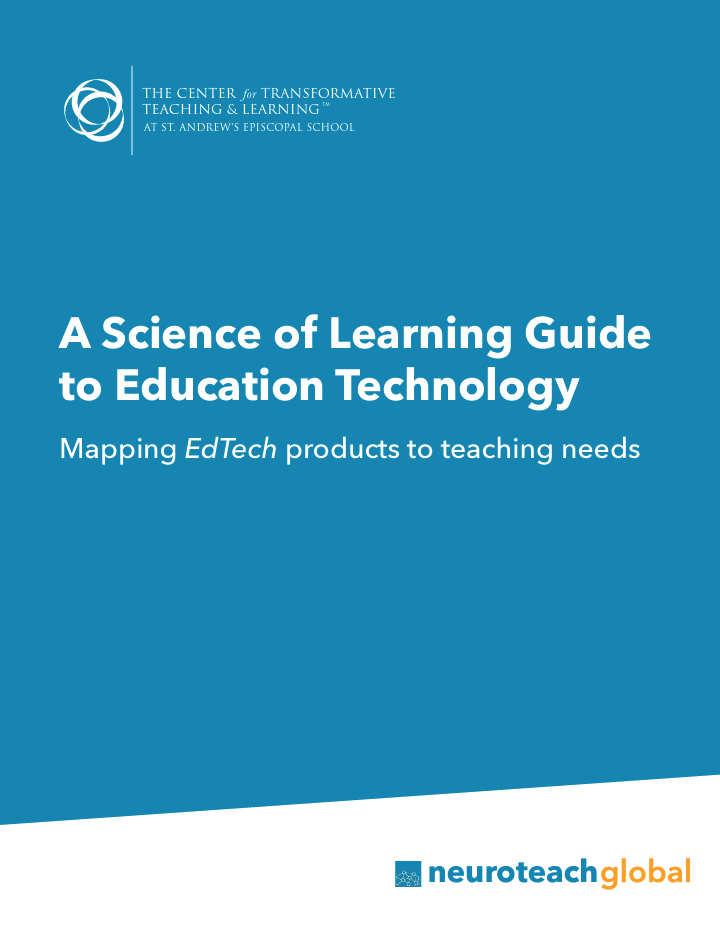RESEARCH BASE
We are often asked “What should I be reading to better connect Mind, Brain, and Education to how I think about teaching and learning?” Our answer is rooted in our own experience: it depends where you are on your MBE journey. We hope our attempt to organize an “MBE readings pathway” helps.
MENU
- MBE Level I
- MBE Level II
- MBE Level III
- MBE Level IV
- Books on MBE
- Diversity, Equity, and Belonging (DEB)
- EdTech
- Literacy
- Mathematics
- Leadership and Expert Teachers
- Research Methods
- The Brain and Learning
- Child Development
- Education Systems
- Strategies and Techniques
- Online Resources
- Online Resources for the Early Childhood Placemat
- Resources for Elementary Roadmap
- Resources for MBE Placemat
- Frederick County Public Schools Case Study
LEVEL I: Free, short online overviews
- American Psychological Association: Top 20 Principles from Psychology for PreK-12 Teaching and Learning
- Christina Hinton, Kurt W. Fischer, and Catherine Glennon The Students at the Center Series: Mind, Brain, and Education
- Deans for Impact The Science of Learning
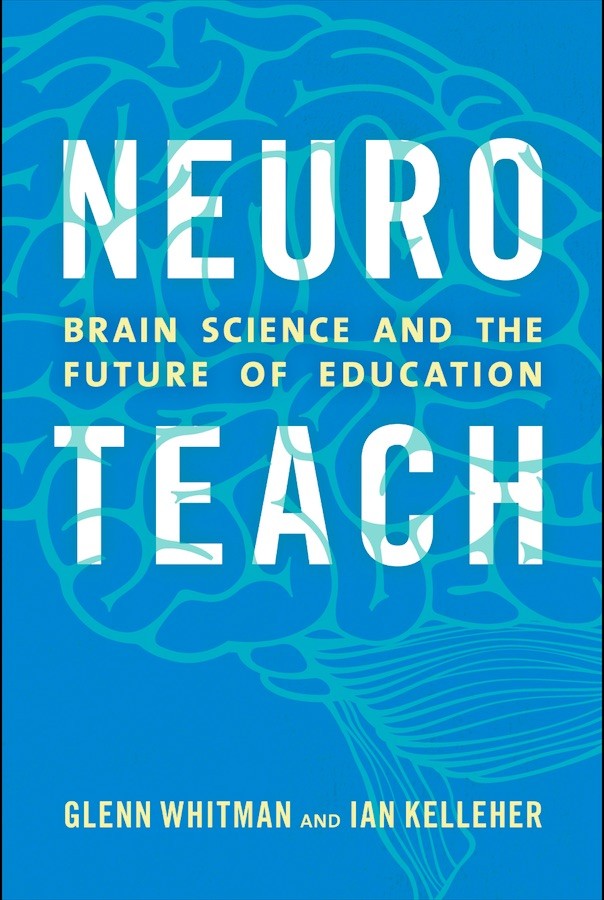
LEVEL II: Books that provide an overview and vision of how MBE Science can transform schools and classrooms
- Glenn Whitman and Ian Kelleher Neuroteach: Brain Science and the Future of Education
- Daniel Willingham Why Don’t Students Like School? A Cognitive Scientist Answers Questions About How the Mind Works and What It Means for the Classroom
- Pamela Cantor and David Osher The Science of Learning and Development: Enhancing the Lives of All Young People
- Pedro De Bruyckere The Ingredients for Great Teaching
- National Research Council How People Learn: Brain, Mind, Experience, and School: Expanded Edition and How People Learn II: Learners, Contexts and Cultures
- Bradley Busch and Edward Watson The Science of Learning: 77 Studies that Every Educator Needs to Know
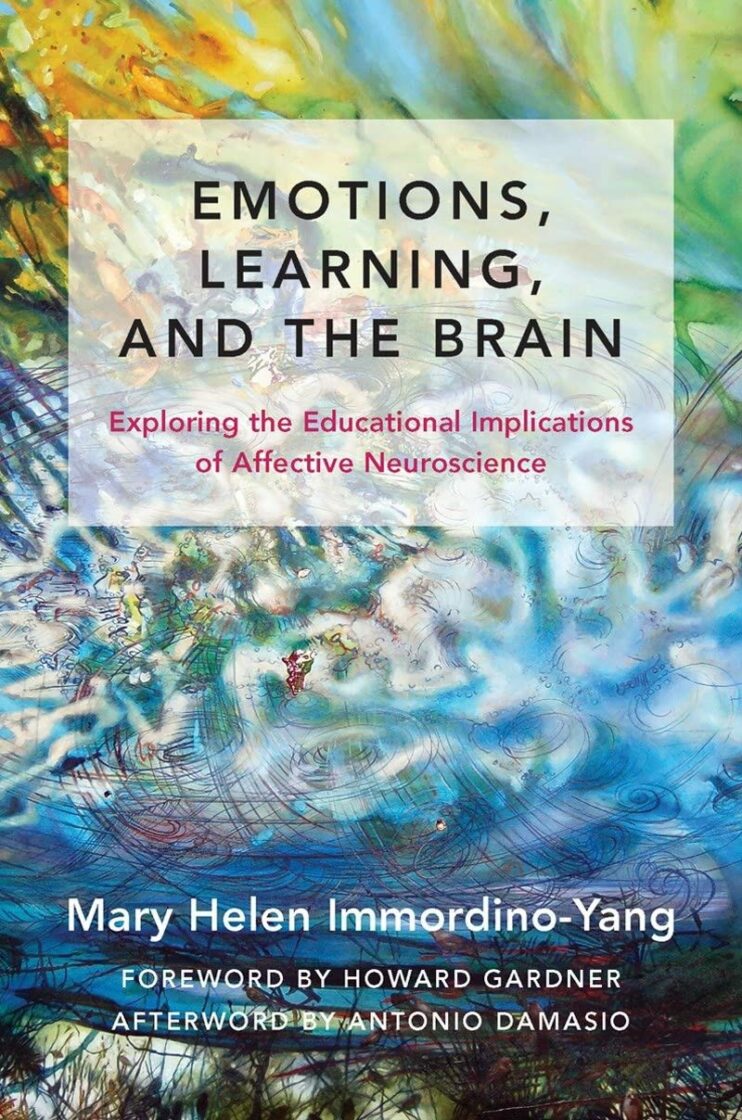
LEVEL III: Books for when you are familiar with LEVEL II and want something meatier
- Pooja K. Agarwal & Patrice M. Bain Powerful Teaching: Unleash the Science of Learning
- John Hattie Visible Learning: A Synthesis of Over 800 Meta-Analyses Relating to Achievement
- Mariale Hardiman The Brain-Targeted Teaching Model for 21st Century Schools
- Dylan Wiliam & Siobhan Leahy Embedding Formative Assessment: Practical Techniques for K-12 Classrooms
- Pedro De Bruyckere, Paul Kirschner, and Casper Hulshof More Urban Myths About Learning and Education: Challenging Eduquacks, Extraordinary Claims, and Alternative Facts
- David Didau What If Everything You Knew About Education Was Wrong?
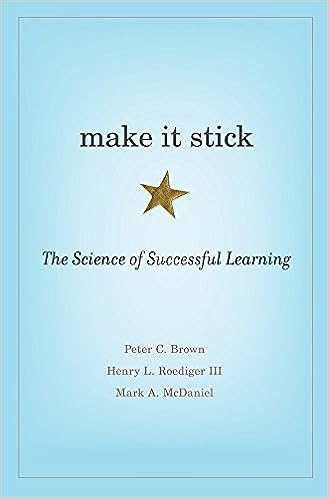
LEVEL IV: Deeper dive into specific topics
NEW: Research behind Neuroteach Global Student™
Student Learning Strategies
- McDaniel, M.A., & Einstein, G.O. (2020). Training Learning Strategies to Promote Self-Regulation and Transfer: The Knowledge, Belief, Commitment, and Planning Framework. Perspectives on Psychological Science, 15(6), 1363–1381.
- Pashler, H., Bain, P., Bottge, B., Graesser, A., Koedinger, K., McDaniel, M.A., and Metcalfe, J. (2007). Organizing Instruction and Study to Improve Student Learning (NCER 2007-2004). Washington, DC: National Center for Education Research, Institute of Education Sciences, U.S. Department of Education.
- Dunlosky, J., Rawson, K.A., Marsh, E.J., Nathan, M.J., & Willingham, D.T. (2013). Improving Students’ Learning With Effective Learning Techniques: Promising Directions From Cognitive and Educational Psychology. Psychological Science in the Public Interest, 14(1), 4–58.
- Carpenter, S.K., Pan, S.C. & Butler, A.C. (2022). The science of effective learning with spacing and retrieval practice. Nat Rev Psychol 1, 496–51.
- Hattie, J., Donoghue, G. (2016). Learning strategies: a synthesis and conceptual model. npj Science Learn 1, 16013.
- Make it Stick: The Science of Successful Learning, By Peter C. Brown, Henry L. Roediger, III, and Mark A. McDaniel (2014).
- McDaniel, M.A.; Einstein, G.O.; Een, E. (2021). Training College Students to Use Learning Strategies: A Framework and Pilot Course. Psychology Learning and Teaching, 20(3), 364-382
- Karpicke, J.D., Butler, A.C. and Roediger III, H.L. (2009). Metacognitive strategies in student learning: Do students practise retrieval when they study on their own? Memory, 17:4,471-479
- Kornell N., Bjork R.A. (2008). Optimising self-regulated study: the benefits – and costs – of dropping flashcards. Memory, 16(2):125-36.
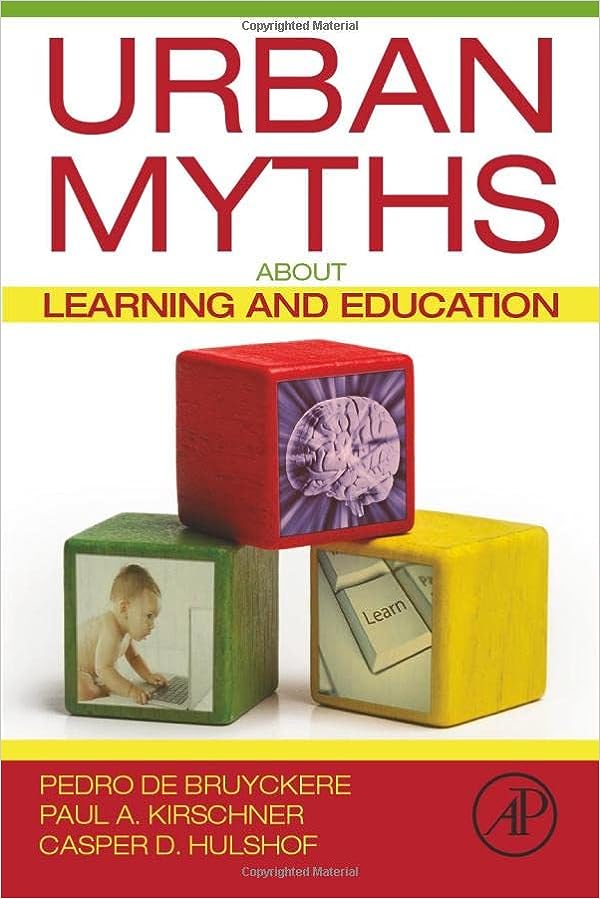
Quite general books on evidence informed practice:
- Denise Pope Overloaded and Underprepared: Strategies for Stronger Schools and Healthy, Successful Kids
- Christopher Emdin For White Folks Who Teach in the Hood… and the Rest of Y’all Too: Reality Pedagogy and Urban Education
- Daniel Schwartz, Jessica Tsang, and Kristen Blair The ABCs of How We Learn: 26 Scientifically Proven Approaches, How they Work, and When to Use Them
John Hattie Visible Learning for Teachers: Maximizing Impact on Learning
Pedro De Bruyckere, Paul Kirschner, and Casper Hulshof Urban Myths About Learning and Education
Peter C. Brown, Henry L. Roediger III, Mark A. McDaniel Make It Stick: The Science of Successful Learning
- Paul A. Kirschner and Carl Hendrick How Learning Happens: Seminal Works in Educational Psychology and What They Mean in Practice
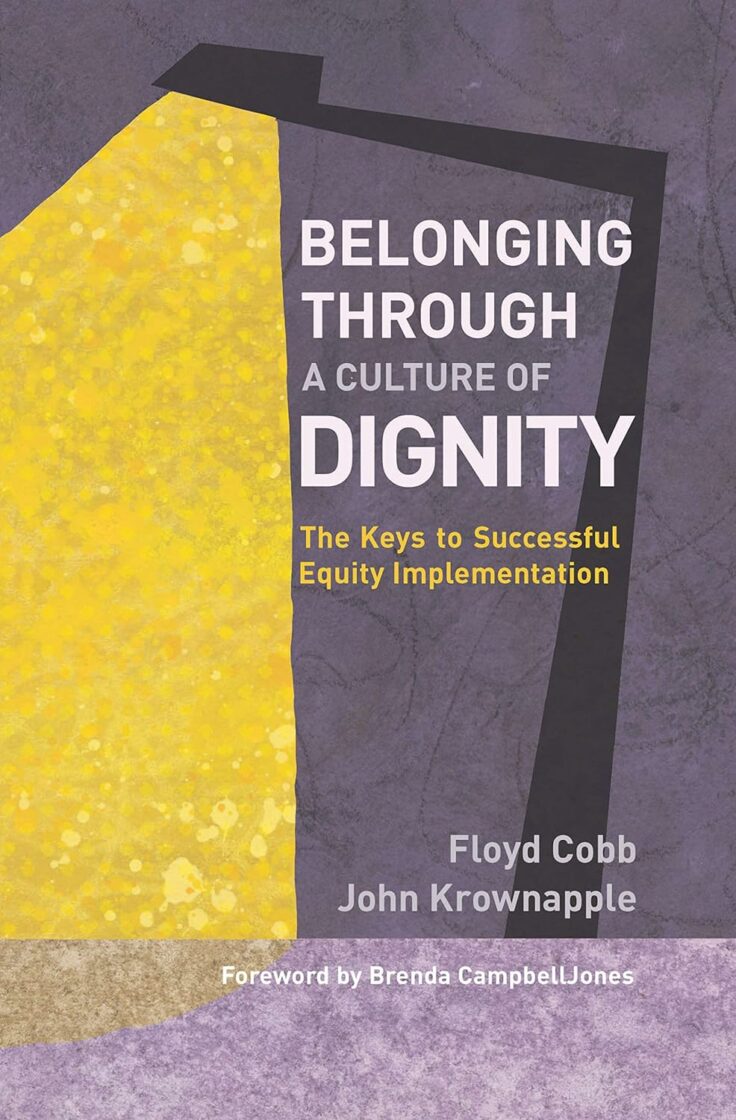
Diversity, Equity, and Belonging (DEB):
- Floyd Cobb and John Krownapple Belonging Through a Culture of Dignity: The Keys to Successful Equity Implementation
- Joe Feldman Grading for Equity: What It Is, Why It Matters, and How It Can Transform Schools and Classrooms
- Zaretta L. Hammond Culturally Responsive Teaching and The Brain: Promoting Authentic Engagement and Rigor Among Culturally and Linguistically Diverse Students
- Claude Steele Whistling Vivaldi and Other Clues to How Stereotypes Affect Us
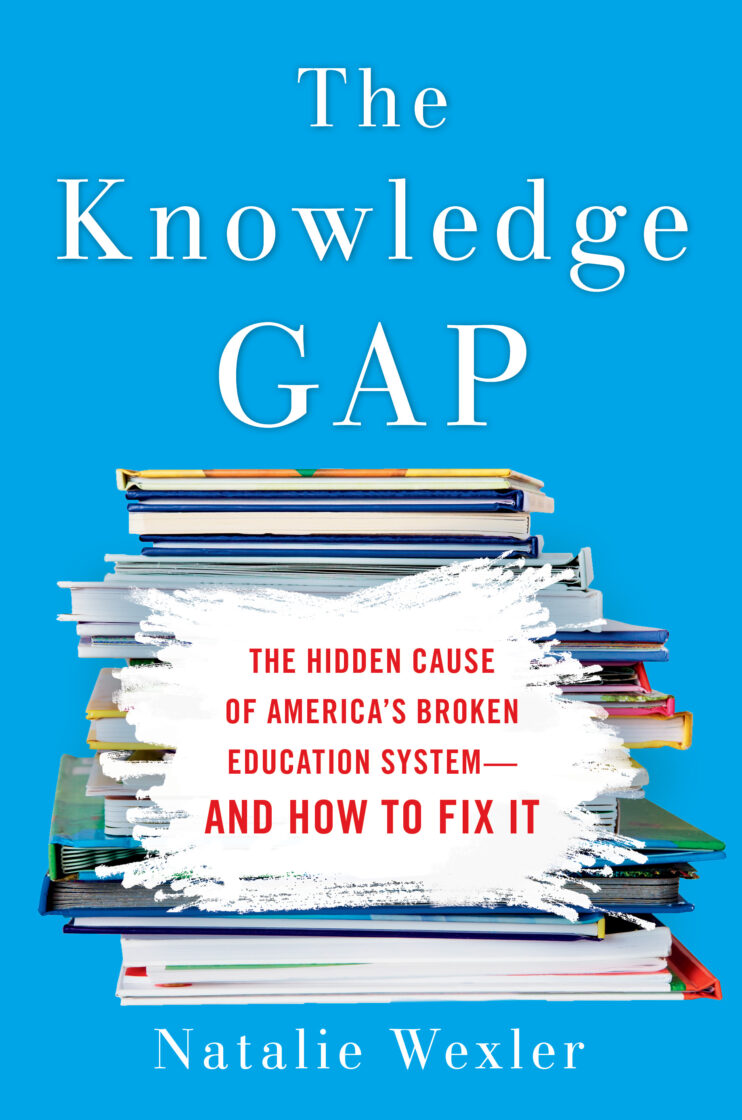
Literacy
Susan Neuman and David Dickinson Handbook of Early Literacy Research, Volume 3
Gough, P.B. & Tunmer, W.E. (1986). Decoding, reading, and reading disability. Remedial and Special Education, 7, 6-10
National Institute for Literacy Executive Summary: Developing Early Literacy: Report of the National Early Literacy Panel
- John Hattie Visible Learning for Literacy, Grades K-12: Implementing the Practices That Work Best to Accelerate Student Learning
- Alex Quigley Closing the Vocabulary Gap
- Natalie Wexler The Knowledge Gap
- Daniel Willingham The Reading Mind: A Cognitive Approach to Understanding How the Mind Reads
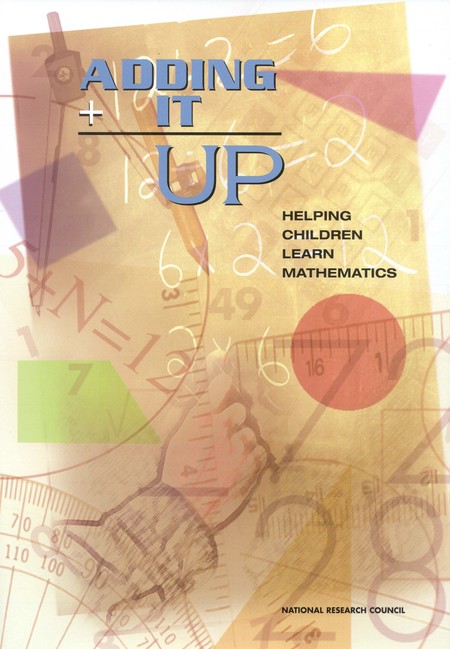
Mathematics:
- What Works Clearinghouse 5 Evidence-Based Recommendations for Teaching Math to Young Children
- National Research Council Adding It Up: Helping Children Learn Mathematics
- Reynaldo Estevez Encyclopedia of Mathematics Education
- National Council of Teachers of Mathematics Linking Research and Practice
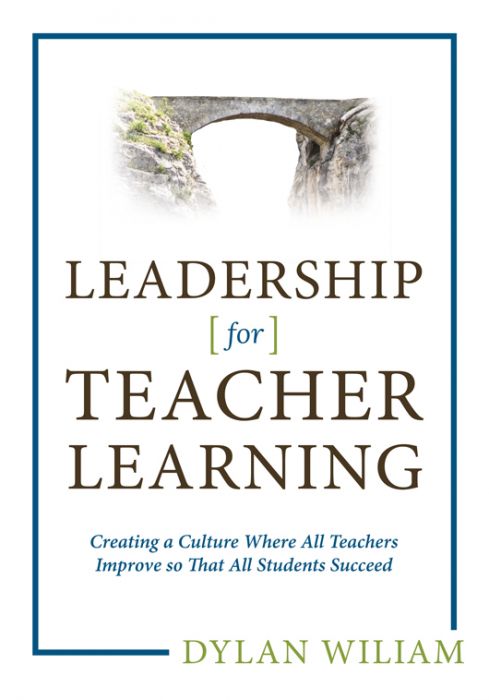
Leadership and developing expert teachers:
- David Weston Unleashing Great Teaching: The Secrets to the Most Effective Teacher Development.
- Dylan Wiliam Leadership for Teacher Learning: Creating a Culture Where All Teachers Improve So That All Students Succeed
- Julie Wilson The Human Side of Changing Education: How to Lead Change With Clarity, Conviction, & Courage
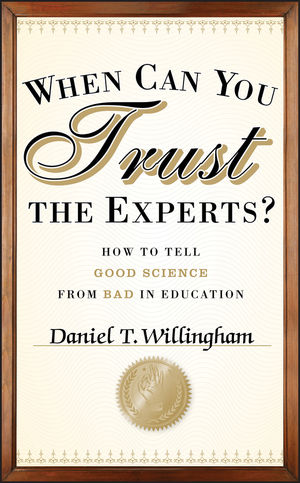
Research methods:
- Craig Mertler Action Research: Improving Schools and Empowering Educators
Robert Janke and Bruce Cooper Errors in Evidenced-Based Decision Making: Improving and Applying Research Literacy
Andrew Watson The Goldilocks Map: A Classroom Teacher’s Quest to Evaluate ‘Brain-Based’ Teaching Advice
- Paul Howard Jones Introducing Neuroeducational Research: Neuroscience, Education and the Brain from Contexts to Practice
- Beth Morling Research Methods in Psychology: Evaluating a World of Information
- Daniel Willingham When Can You Trust the Experts? How to Tell Good Science from Bad in Education
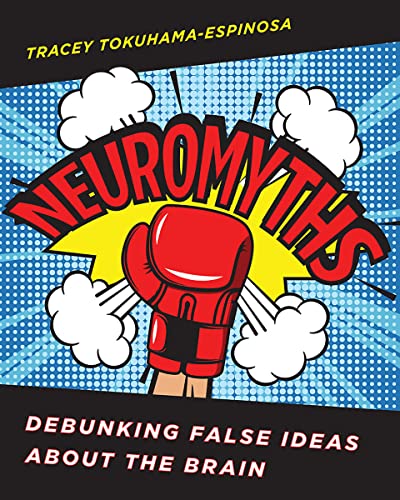
Deeper dive into the brain and learning:
- Kurt W. Fischer and Mary Helen Immordino-Yang The Jossey-Bass Reader on the Brain and Learning
- Paul Howard Jones Evolution of the Learning Brain: Or How You Got to Be So Smart…
- Yana Weinstein , Megan Sumeracki, and Oliver Caviglioli Understanding How We Learn: A Visual Guide
- Daniel Kahneman Thinking Fast and Slow
- Mary Helen Immordino-Yang Emotions, Learning, and the Brain: Exploring the Educational Implications of Affective Neuroscience
- Tracey Tokuhama-Espinosa Neuromyths: Debunking False Ideas About The Brain
- Eric R. Kandel In Search of Memory: The Emergence of a New Science of Mind
- Cathy Davidson Now You See It: How the Brain Science of Attention will Transform the Way We Live, Work, and Learn
- Hana Ros and Matteo Farinella Neurocomic
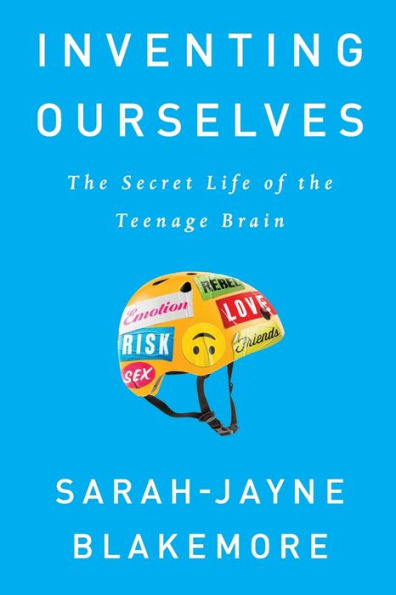
Child Development:
- Deans for Impact Early Child Development
- Cantor, P., Lerner, R.M., Pittman, K.J., Chase, P.A., & Gomperts, N. (2021). Whole-Child Development, Learning, and Thriving: A Dynamic Systems Approach
Jack P. Shonkoff and Deborah A. Phillips From Neurons to Neighborhoods: The Science of Early Childhood Development
- Sarah-Jayne Blakemore Inventing Ourselves: The Secret Life of the Teenage Brain
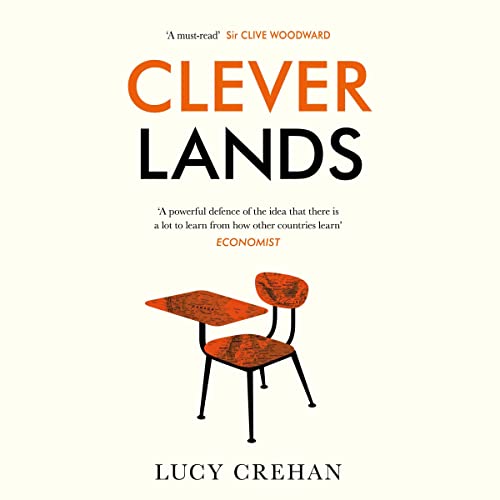
Educational Systems (comparisons, critiques and evidence-informed overhauls)
- Dylan Wiliam Creating the Schools Our Children Need: Why What We’re Doing Now Won’t Help Much (And What We Can Do Instead)
- Lucy Crehan Cleverlands: The Secrets Behind the Success of the World’s Education Superpowers
- Susan Greenfield Mind Change: How Digital Technologies are Leaving their Mark on our Brains
- David Didau Making Kids Cleverer: A manifesto for closing the advantage gap
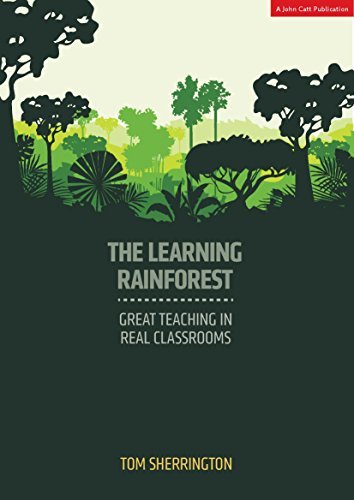
Practical, implementable strategies and techniques
- Judy Willis Research-Based Strategies to Ignite Student Learning: Insights from a Neurologist and Classroom Teacher
- Ron Ritchhart Making Thinking Visible: How to Promote Engagement, Understanding, and Independence for All Learners
- Robert Dillon The Space: A Guide for Educators
- Harris Cooper The Battle Over Homework: Common Ground for Administrators, Teachers, and Parents, 3rd Edition
- Tom Sherrington The Learning Rainforest: Great Teaching In Real Classrooms
- Meg Lee and Mary Kay Ricci Mindsets for Parents: Strategies to Encourage Growth Mindsets in Kids
Online Resources
- The Mindset Scholars Network
- “Developing Great Teaching” from the Teacher Development Trust
- “Vrain Waves” podcast
- The “Teaching and Learning Toolkit” from The Education Endowment Foundation (EEF)
- “Understanding the Brain: The Birth of a Learning Science” (OECD)
- “What Makes Great Teaching?” by Robert Coe, Cesare Aloisi, Steve Higgins and Lee Elliot Major, from the Sutton Trust
- The Dana Foundation: Your Gateway to Responsible Information About the Brain
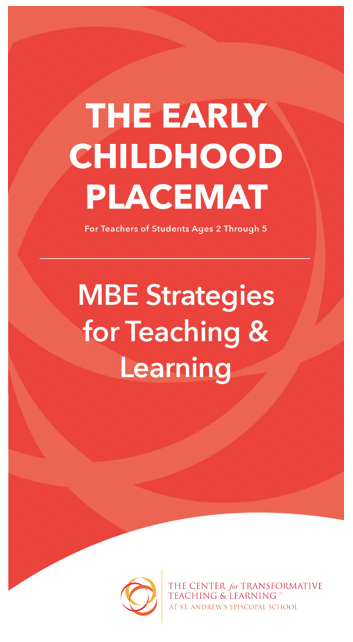
Online Resources for the Early Childhood Placemat
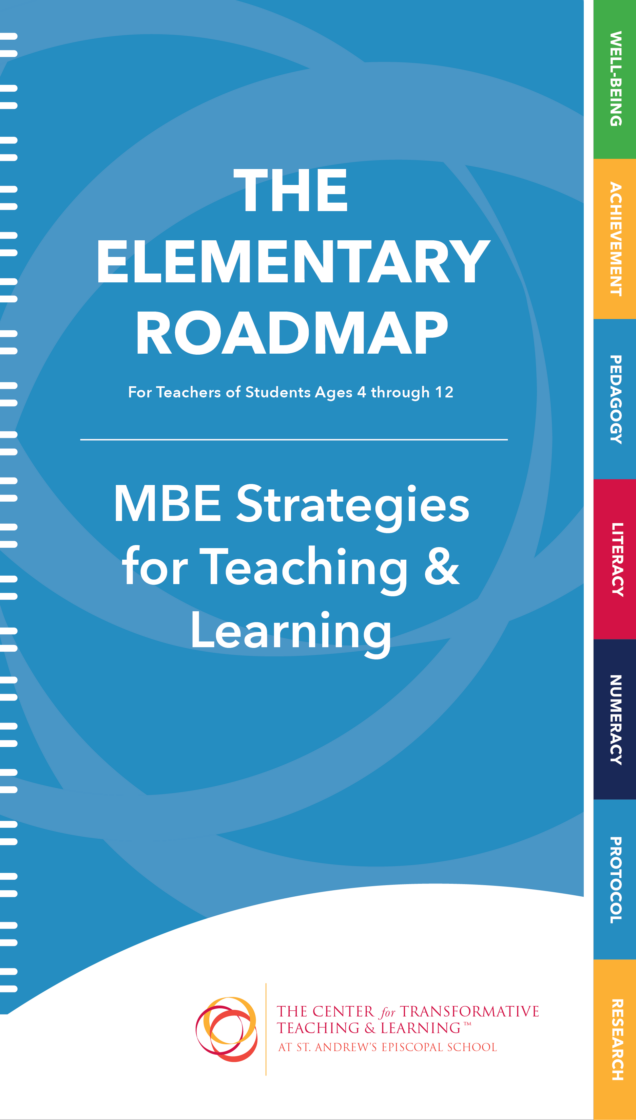
Resources for Elementary Roadmap
- Neuroscience and Education: A Review of Education Interventions and Approaches Informed by Neuroscience (2014).
- Clark, R. et al. (2012). Putting Students on the Path to Learning: The Case for Fully Guided Instruction. American Educator. 36. 6-11.
- American Psychological Association, Coalition for Psychology in Schools and
- Education. (2015). Top 20 principles from psychology for PreK–12 teaching and learning.
LITERACY
- Digital Promise, Learner Variability Navigator
- Developing Early Literacy: Report of the National Early Literacy Panel (2009). National Institute for Literacy.
- NCEE 2016-4008 U.S. Department of Education (2019), Foundational Skills to Support Reading for Understanding.
NUMERACY
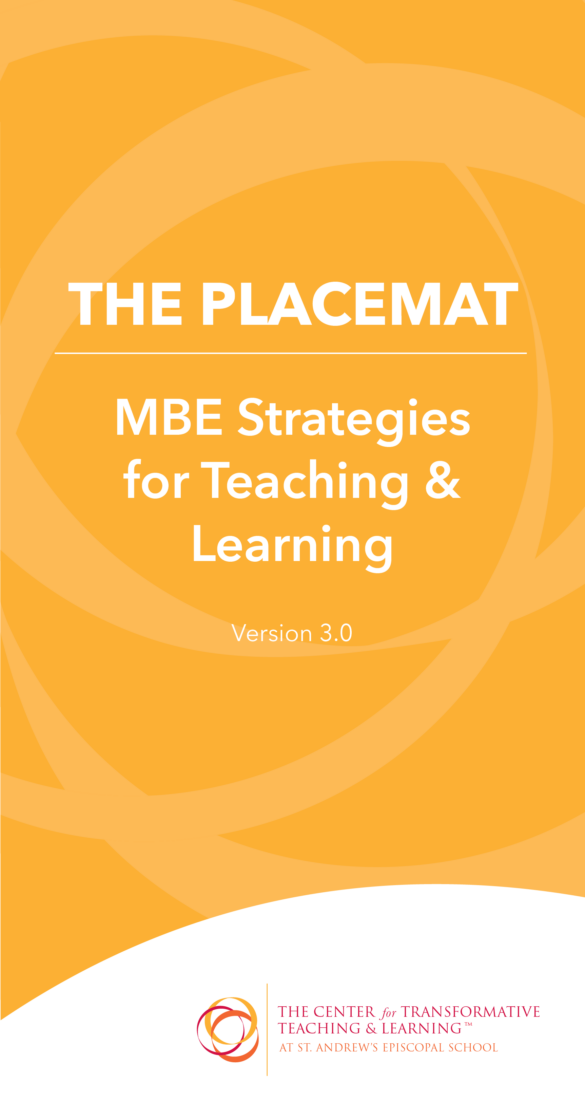
Resources for MBE Placemat
- IES National Center for Education Research, Organizing Instruction and Study to Improve Student Learning
- Education Endowment Foundation, Neuroscience and Education: A Review of Education Interventions and Approaches Informed by Neuroscience, Howard-Jones, 2014
- Sutton Trust, What Makes Great Teaching? Review of Underpinning Research, Coe, Aloisi, Higgins and Elliot Major, 2014
- Improving Students’ Learning With Effective Learning Techniques:
- Promising Directions from Cognitive and Educational Psychology, Dunlosky, Rawson, Marsh, Nathan and Willingham, APS, 2013
- Deans for Impact, The Science of Learning, 2015
- Principles of Instruction: Research-Based Strategies that All Teachers Should Know, Barak Rosenshine, American Educator, Spring 2012
- Students at the Center, Mind, Brain and Education, Hinton, Fischer and Glennon, 2012
- 25 Learning Principles to Guide Pedagogy and the Design of Learning Environments, Graesser, Halpern & Hakel, 2007
- American Psychological Association, Top 20 Principles from Psychology for PreK-12 Teaching and Learning, 2015
- The Learning Scientists, Six Strategies for Effective Learning
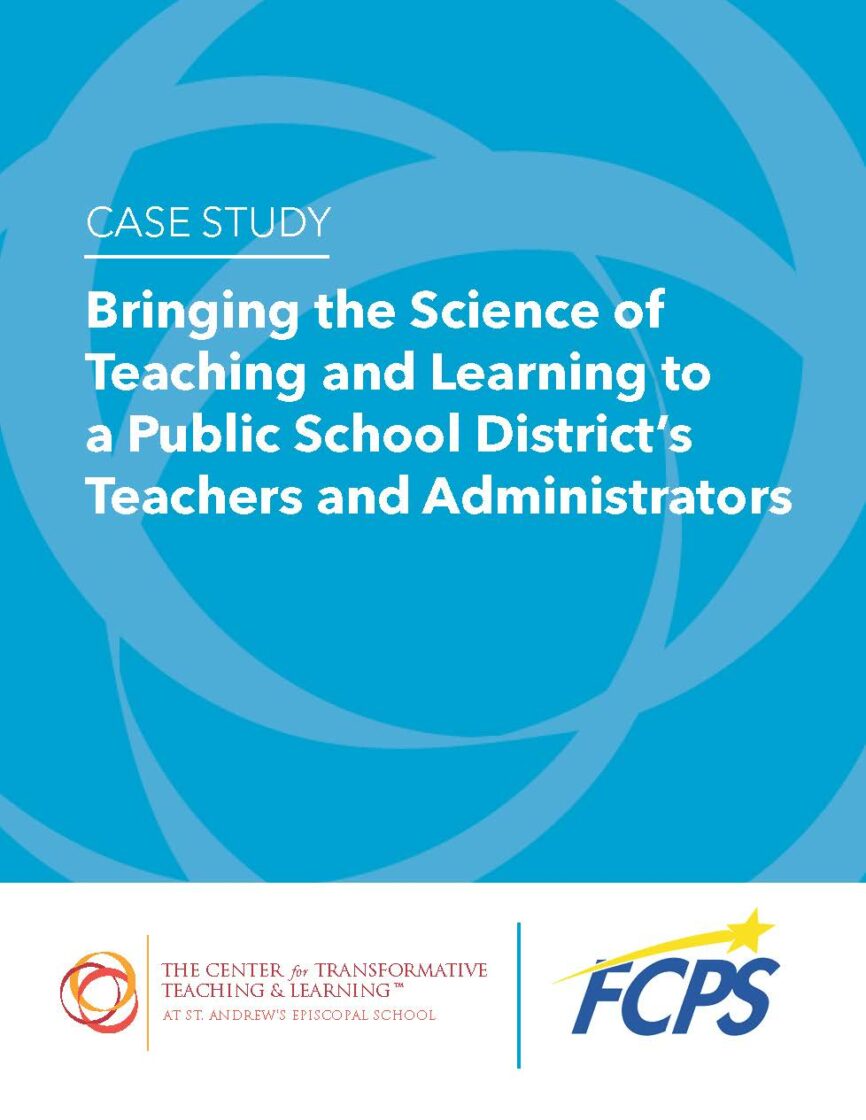
Frederick County Public Schools Case Study
The Center for Transformative Teaching and Learning at St. Andrew’s Episcopal School and Frederick County Public Schools (MD) collaborated to produce this case study to provide a replicable model of how the science of teaching and learning is changing educator practice at a large scale, and in a school system that shares many of the challenges of other public school districts throughout the United States.
We probably missed some great books when we made our list. We mean no offense — it might just be a slip on our part. Please write and let us know your recommendations: info@thecttl.org
The CTTL receives no compensation, financial or otherwise, for making these recommendations.

